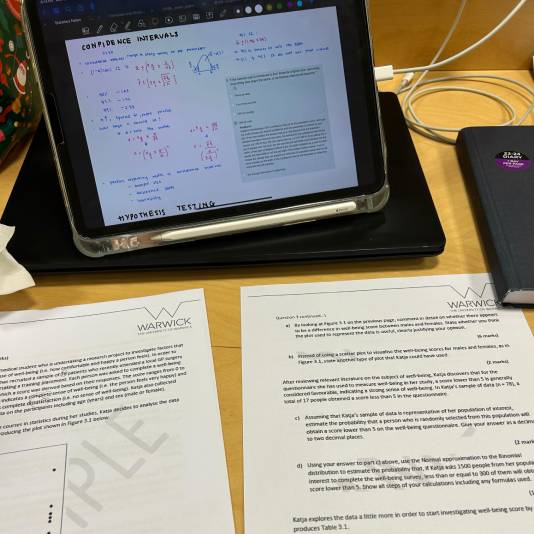Exam preparation can be challenging, but in this step-by-step guide, Undergraduate student Aashni Sadanandan shares her top tips for staying organised, confident and ready for success.
The study resources I use to prepare for my exams
Exam season can be a stressful and overwhelming experience for many, especially if you are not well-prepared or have a lot of content to cover. One strategic way to tackle stress during exam season is to manage your resources effectively and utilise them wisely.
Here are the key study resources that help me prepare for my exams:
Seminar Materials
Seminar questions, especially in Accounting and Finance modules, often closely resemble the exam paper style. Sometimes, they will change the numerical values or scenarios, but the underlying concepts and problem-solving processes remain the same. Seminar questions are designed to follow the syllabus outline, ensuring the key concepts are well understood. For example, in a module like Business Law, seminar questions are particularly helpful in developing answering techniques. Meanwhile, in Financial Reporting, seminar questions help you to grasp key techniques when preparing financial statements, by giving various scenarios and techniques to prepare them according to the appropriate standard.
Lecture Slides
Next, I find that lecture slides are very useful since they are the primary materials used by lecturers in their teaching. They highlight the important points and takeaways discussed in lectures. I prefer using the lecture slides, as they provide a clear and concise summary of topics covered in the module. This resource is helpful to reinforce my understanding and to ensure that I focus on the relevant material.
Mock and Past Papers
Practising mock and past papers is one of the most effective ways to prepare for exams. Mock papers are usually given at the end of the term and serve as a great tool to assess my level of understanding and preparedness. Mock papers are designed according to the format of the real exam papers and provide a good indication of the exam format.
 Besides mock exam papers, I would go to the A-Z Index in my.wbs to find past papers which you can complete in timed conditions. However, I always double-check that the past paper format aligns with the current syllabus, as some modules undergo changes over time.
Besides mock exam papers, I would go to the A-Z Index in my.wbs to find past papers which you can complete in timed conditions. However, I always double-check that the past paper format aligns with the current syllabus, as some modules undergo changes over time.
Forum Discussions
The forum section on each module page is a valuable platform for learning. By reviewing questions posted by peers and reading the responses from lecturers or fellow students, I gain insights into different perspectives and potential exam questions that I may not have encountered or thought of. This is also a good way to broaden my perspective and think outside of the box.
Drop-In Session and Office Hours
If you prefer a more direct interaction, I recommend going to the module leader’s or seminar tutor’s office hours. This opportunity allows you to ask specific questions and seek clarification on complex topics that you may find confusing. This engaging one-to-one discussion has allowed me to grasp key concepts and avoid last-minute confusion before exams.
One final thought is that cramming during the exam preparation period can lead to burnout, therefore, it is important to get sufficient rest and sleep to maintain focus and an efficient mind during your exam.
I hope this guide is helpful for you, and all the best with your upcoming exams!




 X
X Facebook
Facebook LinkedIn
LinkedIn YouTube
YouTube Instagram
Instagram Tiktok
Tiktok